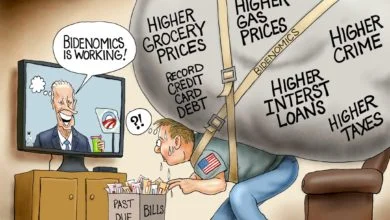New Jobs Report Proves That Bidenomics Is Failing American Workers

There’s no question about it now: The labor market is weakening. Friday’s jobs report showed 187,000 new jobs were created in August, well below the 12-month average, and the unemployment rate jumped. August marks the third consecutive month with fewer than 200,000 jobs created. June and July job creation was massively revised down by 110,000 in what’s becoming a common trend. And real wages grew slower than core inflation, continuing the nation’s decline in living standards.
For many months now, the labor market hasn’t been as robust as President Biden and his media allies have claimed in an effort to gaslight the American public about the strength of the economy. Last week, the Labor Department downwardly revised job creation between March 2022 and March 2023 by 306,000 jobs, an average of 25,000 fewer jobs per month. These ongoing significant downward revisions suggest we should be discounting the monthly jobs numbers rather than playing them up.
On Tuesday, the Labor Department released a separate report showing that the number of available jobs in the economy has fallen to its lowest level since March 2021. It also revealed the quits rate, a widely used proxy for the health of the broader labor market, has fallen back to prepandemic levels.
Given the challenges facing American small businesses, which create two-thirds of new jobs, this labor market weakness is no surprise. Small businesses are facing a one-two punch of high inflation and high interest rates. The most recent inflation indicators show that price increases are accelerating once again. This Bidenflation erodes profit margins and alienates customers.
Meanwhile, interest rates are at a 22-year high, reducing access to credit. They will likely have to move even higher in the months ahead in an attempt to finally control inflation.
Consider the story of Rafael Cuellar, the owner of ShopRite Supermarkets in Passaic City, New Jersey, to understand Bidenomics’ impact on small businesses. In a recent interview on my new podcast, Main Street Matters, he told me that the profit margin for grocery stores such as his is less than one percent. Skyrocketing food and energy costs constantly threaten to swamp this razor-thin margin and make his business unprofitable.
Such small businesses have no choice but to pass these costs on to their customers. But consumers are price sensitive, and higher prices reduce demand, reducing job opportunities.
According to Job Creators Network’s SBIQ national poll of small business owners, inflation remains respondents’ biggest concern. Two-thirds are also concerned that rising interest rates will reduce their access to credit. Overall, small business confidence is at its lowest level since we began conducting the poll in the spring of 2021.
Small businesses urgently need help from Congress and the Biden administration. The Federal Reserve can only do so much. Congress can help reduce inflation by ending its reckless spending that leads to too many dollars chasing too few goods and devalues the currency already in existence. The 2023 federal budget deficit is projected to be $1.5 trillion. This deficit is an increase from last year, higher than during the Great Recession in 2009, and a ridiculous sum for an economy running at full capacity.
Balancing the budget can bring inflation under control without having to raise interest rates further. Unfortunately, this sensible approach conflicts with the Biden administration’s command and control economic, welfare, and industrial policies.
Ending reckless spending is part of an eight-point pro-growth policy agenda that Job Creators Network developed called the American Small Business Prosperity Plan. It reduces inflation, expands access to credit, grows real wages, and boosts the labor market by empowering small businesses over big government. Policymakers should use it as a playbook to get the economy thriving again.
Small businesses are America’s job creation engine. As long as they face the twin threats of high inflation and high interest rates, without any help from the Biden briefing administration or Congress, expect the labor market to continue its decline in the months ahead.
Alfredo Ortiz is president and CEO of Job Creators Network, author of The Real Race Revolutionaries, and co-host of the Main Street Matters podcast.
The views and opinions expressed in this commentary are those of the author and do not reflect the official position of the Daily Caller News Foundation.
Content created by The Daily Caller News Foundation is available without charge to any eligible news publisher that can provide a large audience. For licensing opportunities of our original content, please contact licensing@dailycallernewsfoundation.org




